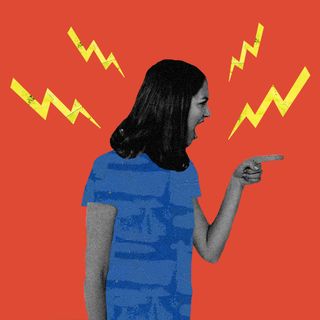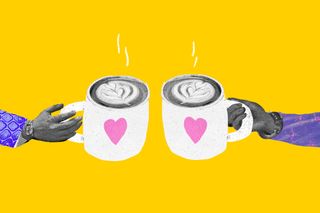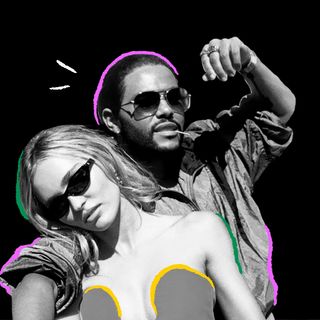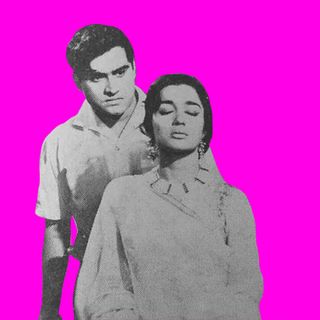
The Rise of ‘Dry Dating,’ or Dating While Sober, Explained
Dry dating emphasizes emotional connections and shared values over fleeting experiences induced by alcohol-influenced connections.

Have you ever been on a date — butterflies fluttering in your stomach and nervous excitement in the air — as you sip on a glass of sparkling wi… (sorry) water? This encapsulates the “dry dating” experience. It may sound like a new laundry technique to get rid of wine stains, but it’s not. Instead, it’s a dating trend where the clinking of glasses is replaced by the clinking of genuine conversations and the fizz of meaningful connections. In a post-pandemic society, where wellbeing reigns supreme and self-care is all the rage, going sober on dates has become the hottest trend since avocado toast as people are beginning to bid adieu to liquid courage and embark upon their romantic adventures with a clear head and a sparkling personality instead.
Dry dating is, perhaps, a manifestation of the sober-curious movement, which encourages individuals to question their relationship with alcohol and consider the benefits of sobriety. Driven by a wide range of factors — from increased health consciousness, to evolving attitudes towards the drinking culture that dominates social scenes, to aspiring to fewer alcohol-influenced connections with people — the rise of dry dating reflects a post-pandemic shift in our social outlook. In doing so, it aligns with broader movements promoting wellbeing and mindfulness by encouraging people to approach dating with intention and consciousness — emphasizing emotional connections and shared values over fleeting experiences.
In the context of dating, the pursuit of forging deeper emotional connections can become even more relevant — depending, of course, on one’s desired outcome. According to a survey conducted by the dating app Bumble in India, 56% of the responders said they don’t prefer drinking on dates because they “want to get to know the other person with a clear mind.” 24% of the responders also noted that they’re planning to avoid alcohol on dates in 2023. “I am now able to think from my mind and not my dick… I’m having a stronger dialogue both with myself and the date. I’m finally in a space where I can once again have conversations about life and dreams,” Siddharth, then 35, told The Vice last year, on his experience of staying sober on dates.
Dry dating has become a global phenomenon, too. Naomi, 30, who has been practicing dry dating, swears by it now. Speaking to Stylist, she says, “Before, when my first dates were centred around alcohol, I often found myself coming away and wondering if there was any connection or attraction. Or, if I did think there was a connection, I’d go on a second date and realise the only thing we had in common was enjoying pints in a pub… [W]ithout alcohol, I think the effort to be more authentically yourself is there and it’s clearer if there is a spark or a connection.”
Related on The Swaddle:
Why Going On Dates to Find Friends – Not Love – Is Getting Popular
Another perk of the trend: it enables individuals in recovery from substance abuse to navigate the realm of modern dating without compromising their commitment to sobriety. Dry dating, thus, has the potential to reshape the dating landscape — providing inclusive spaces for individuals with varying lifestyles and preferences.
Moreover, being intoxicated on a date with a stranger can endanger one’s safety, too. “I could only allow someone to touch me after I was drunk… But while some dates were beautiful, others ended up in me being sexually assaulted because I just couldn’t fight back,” Siddharth recalls. In addition, by impairing one’s cognition, drinking can also open them up to the risk of unintended pregnancies and STIs — often, as a result of not taking adequate precautions. Needless to say, both can entail long-term consequences.
However, aside from the boozing culture conditioning us to think it’s the best way to fit in, have fun, and form honest, no-holds-barred friendships, there’s a legitimate reason why drinking on dates has been so popular. For many, it’s a way to cope with social anxiety; because alcohol also has the benefit of being a socially acceptable means of lowering inhibitions and relieving stress, people might reach for it if they’re feeling overwhelmed or stressed — as one often does while meeting a new person they’re interested in pursuing romantically, sexually, or both. “[E]specially on a first date with a stranger from the internet, [I think] a little social lubrication is necessary… I have whatever hang-ups and traumas that can sometimes make sex (especially with a new partner) feel daunting to some extent or other, but I know I want to be able to hook up and leave those inhibitions at the door, so I get drunk to be able to explore and enjoy my own pleasure,” Stella from New York, then 25, told Elite Daily.
And so, the rise of dry dating may leave many individuals feeling out of their element on first dates without the social crutch of a cocktail to lean on. “I ended up going on 18 first dates in April and May last year and didn’t say yes to any second dates. The main thing that was wrong with all of my initial sober dates was me. I was unsure of myself. I was like Bambi, unsteady on my new spindly legs, which meant I had lost a lot of my bravado and charm,” writer Jamie Klingler noted in The Guardian. “What are you supposed to do on a date if not drink? How do you get up the nerve to kiss them? What am I meant to do if not drink until they get funny or handsome enough for the aforementioned kissing?”
Related on The Swaddle:
‘Slow Living’ Is an Antidote to Exhaustion Under Capitalism — But Exhausting to Achieve
Enter: alternatives to drinking that can produce an adjacent effect. “You can design a[n alcohol-free] pre-date ritual to help you get into the same confident mindset. Listen to a pump up playlist, call a friend for a pep talk, or make a mental list of all the reasons why you’d be a great partner,” advises Logan Ury, a behavioral scientist-turned-dating coach.
Klinger has, finally, “learned how to date without drinking.” But if dry dating does induce a sense of discomfort for one, it could, perhaps, double up as an opportunity for them to evaluate their relationship with drinking, and assess whether there’s something larger lurking beneath the need to seek an ally in alcohol. Just letting the awkwardness and unease of being sober on a date wash over oneself could be helpful, too. As editor Julia Bainbridge wrote in Man Repeller, “I’ll drink again at some point, and I’ll drink on dates again. I’ll enjoy it, too. But right now, I’m leaning into the discomfort. The wine is gone, but so is the haze it brings with it.”
Having said that, trying to impose the idea of dry dating on unwilling participants isn’t cool either — in the same way that it’s loathsome to force people to grab a drink on their first date so they can “let loose” and “open up.” Indeed, consumption of alcohol is injurious to our health — besides our personal safety, of course. But it shouldn’t become an instrument to morally police the drinking habits of people who are legally allowed to partake of alcohol, as long as their consumption isn’t harming anyone else.
Dry dating, then, can provide space to have a healthy discussion on boundaries. “If you don’t drink, do you mind if your date does? Let the other person know what you feel comfortable with. They might not know how to navigate the conversation, so lead the way by sharing vulnerably and making them feel safe asking questions,” suggests Ury. At the of the day, it’s pertinent to remember that the trend represents a significant shift in dating norms — influenced by a growing emphasis on wellbeing, not a renewed sense of moral vigor. Indeed, embracing this sobering trend may lead to a more conscious, connected, and diverse dating culture in the post-pandemic world. But that’s not a justification to impose it.
Devrupa Rakshit is an Associate Editor at The Swaddle. She is a lawyer by education, a poet by accident, a painter by shaukh, and autistic by birth. You can find her on Instagram @devruparakshit.
Related


‘The Idol’ Is Proof of Hollywood’s Anti‑MeToo Backslide
